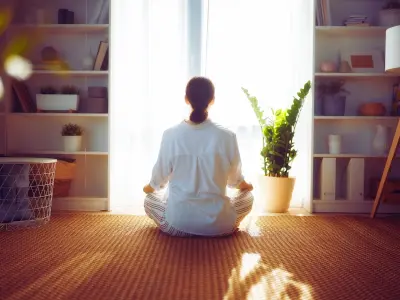Motherhood is a beautiful journey, but it can also be demanding and overwhelming. Between managing daily responsibilities, attending to their children’s needs, and balancing other life roles, mothers often find themselves putting their own mental health on the back burner. A mental health retreat for mothers can be a transformative experience, offering them a chance to recharge, reflect, and rejuvenate in a supportive environment.
In this comprehensive guide, we’ll explore everything you need to know about these retreats, why they matter, and how they can help mothers regain balance in their lives.
Why choose a mental health retreat for mothers?
Many mothers grapple with burnout, anxiety, and feelings of inadequacy due to the constant demands of caregiving. According to the World Health Organization, about one in 10 people who can become pregnant worldwide deal with mental health issues during pregnancy and the postpartum period. Despite these challenges, mothers often hesitate to prioritize their well-being.
A mental health retreat for mothers provides a dedicated space where they can focus on self-care and healing. These retreats combine therapeutic practices, relaxation techniques, and communal support to address emotional struggles and enhance overall well-being.

Benefits of mental health retreats
- Holistic healing: retreats typically integrate a combination of therapies, including mindfulness, yoga, and counseling, to promote mental, emotional, and physical health.
- Time for reflection: away from daily distractions, mothers have the opportunity to reflect on their experiences and reconnect with their inner selves.
- Expert guidance: many retreats offer access to psychologists, therapists, and wellness coaches who specialize in maternal mental health.
- Community support: sharing experiences with other mothers fosters a sense of belonging and reduces feelings of isolation.
Experts at Light Pink Care emphasize that retreats designed specifically for mothers address the unique challenges they face, offering tailored programs that bring lasting benefits.

What to expect during a mental health retreat for mothers
The structure of a mental health retreat for mothers varies depending on the provider and location. However, most retreats include the following elements:
Therapeutic sessions
Psychological therapies such as Cognitive Behavioral Therapy (CBT) and art therapy help mothers process emotions and develop coping strategies. These sessions are often led by licensed professionals, ensuring participants receive expert care.
Know more about
How to be a good stay at home mom
Mindfulness and meditation
Mindfulness practices teach mothers to be present in the moment, reducing stress and improving emotional regulation. Meditation sessions are often tailored to help participants manage anxiety and cultivate inner peace.
Physical activities
Activities such as yoga, hiking, or tai chi are commonly included in retreats. These exercises not only boost physical health but also help release endorphins, improving mood and energy levels.
Workshops and skill-building
Workshops on stress management, parenting strategies, and self-care techniques empower mothers with tools to navigate challenges more effectively.
Recreational activities
Many retreats incorporate fun and leisure activities, such as cooking classes, art projects, or spa treatments, to foster relaxation and enjoyment.
Know more about
How to be a good mom when depressed
Finding the right mental health retreat for mothers
Selecting the right retreat is crucial for a fulfilling experience. Consider the following factors:
- Location: choose a retreat in a tranquil setting that promotes relaxation, such as a beachside resort or a mountain lodge.
- Program Offerings: ensure the retreat provides a well-rounded program that aligns with your needs.
- Professional Staff: verify that the retreat is staffed by qualified professionals with expertise in maternal mental health.
- Duration and Cost: evaluate the length of the retreat and its affordability. Some retreats offer weekend options, while others may last a week or longer.
- Reviews and Recommendations: read testimonials and seek recommendations from trusted sources to gauge the retreat’s quality.
Light Pink Care highlights the importance of researching retreats thoroughly to ensure they cater to your unique needs as a mother.
Know more about
Tips for Managing Pregnancy Insomnia
Top destinations for mental health retreats
Here are a few popular destinations known for hosting exceptional mental health retreats for mothers:
- Sedona, Arizona: renowned for its serene landscapes and holistic wellness centers.
- Bali, Indonesia: offers a blend of spirituality and natural beauty, ideal for relaxation and healing.
- Tuscany, Italy: combines scenic views with luxurious retreats that focus on mental and emotional well-being.
- British Columbia, Canada: known for its peaceful retreats nestled in nature-rich environments.

How to prepare for your retreat
To make the most of your mental health retreat for mothers, follow these preparation tips:
- Set clear goals: identify what you hope to achieve during the retreat, whether it’s reducing stress, building confidence, or finding clarity.
- Pack thoughtfully: bring comfortable clothing, personal items, and any materials suggested by the retreat organizers.
- Inform loved ones: ensure family members are aware of your schedule and can support you in your absence.
- Keep an open mind: be willing to embrace new experiences and step out of your comfort zone.
The impact of mental health retreats
The benefits of attending a mental health retreat for mothers extend well beyond the duration of the program. Participants often report improved mood, enhanced coping mechanisms, and a renewed sense of purpose. Research indicates that these structured programs are linked to reduced stress, anxiety, and depression, as well as improved physical health, including lower inflammation. .
Moreover, these retreats serve as a reminder to prioritize self-care, helping mothers return to their families with greater energy and emotional resilience.
Overcoming common concerns
Some mothers may hesitate to attend a mental health retreat due to guilt or logistical challenges. It’s important to remember that self-care is not selfish—it’s essential. By taking time for yourself, you’re better equipped to support your family.
If childcare or finances are barriers, consider:
- Shorter retreats: weekend programs can provide valuable benefits without requiring extended time away.
- Scholarships or discounts: some retreats offer financial assistance for those in need.
- Local options: explore nearby retreats to reduce travel costs and time commitments.
Final thoughts
A mental health retreat for mothers is a powerful step towards reclaiming balance and nurturing emotional well-being. Whether you’re seeking solace in nature, learning new coping skills, or connecting with other mothers, these retreats offer an unparalleled opportunity for growth and renewal.
By embracing this experience, you not only invest in your own happiness but also set a positive example for your children and loved ones. Remember, prioritizing your mental health is a gift to yourself and those around you.
FAQ Mental health retreat for mothers
What is the purpose of a retreat?
The purpose of a retreat is to provide individuals with a dedicated space for rest, reflection, and personal growth. It offers a break from daily responsibilities and distractions, allowing participants to reconnect with themselves, recharge, and gain clarity. Retreats often focus on mental, emotional, and physical well-being through therapeutic practices, mindfulness, and relaxation techniques, helping attendees reduce stress and improve overall life balance.
How long does a retreat last?
The duration of a retreat can vary depending on the type and purpose. Common retreats range from a weekend (2-3 days) to a full week (7 days). Some retreats may last even longer, offering extended programs for deeper transformation. The length of a retreat is designed to provide ample time for self-reflection, relaxation, and engagement in various activities such as meditation, workshops, and group discussions.

